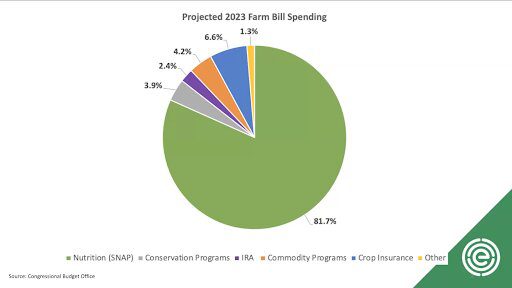Every five years, the federal government re-evaluates and approves a new Farm Bill, which allocates resources to important agricultural and food-related services in our nation. This September, the latest Farm Bill will expire. Right now, congressmen and women are putting forth plans and policies that will shape the next Farm Bill.
Meeting the needs of widows and orphans and seeking justice and righteousness are central concerns of the gospel. As people of faith, our advocacy surrounding certain aspects of the Farm Bill can help ensure that funding is spent to benefit those Jesus called us to love. We can call on our country to make a Farm Bill that will support God’s people and planet.
What Is the Farm Bill?
According to the Congressional Budget Office, the vast majority of funding included in the 2023 Projected Farm Bill (81.7%) is allocated for nutrition and anti-hunger assistance programs, specifically the Supplemental Nutrition Assistance Program, or SNAP. These vital dollars ensure that those who fall close to or below the federal poverty line are able to receive food assistance.
Over 10% (13.5 million) of U.S. households experienced food insecurity sometime in 2021, and over 12.5% of U.S. households with children were food insecure during that same time period. SNAP helps these populations access nutrient-rich food necessary for everyday survival.
Beyond SNAP, the remaining budget allocations in the Farm Bill go toward subsidy programs (11%), conservation programs (3.9%), IRA (2.4%), and other (1.3%).

Advocating for Small Farms is Advocating for Families
Farm subsidies another critical component of the Farm Bill. These subsidies are available to farmers in two different ways: commodity programs and crop insurance.
According to Scott Faber, Senior Vice President of Government Affairs with the Environmental Working Group (EWG) and Adjunct Law Professor at Georgetown’s Law School, both of these subsidies historically benefited larger enterprise farms. Notably, small family farms make up about 89% of all farms, leaving an opportunity for us to consider holding up these family farms with commodity program opportunities.
When it comes to crop insurance, policies are generally designed to protect farmers from drops in revenue rather than crop failure. Because large farms have more crops, sometimes they see the largest payouts. But, where we have an opportunity to evaluate policy and how it affects real life, we can consider the outsized effect revenue drops have on smaller farms – and the families that run them.

Supporting Creation Care
Currently, agriculture produces about 11% of U.S. greenhouse gas emissions, primarily from fertilizer applications and animals and their waste. If agriculture continues on this same path, agriculture will be the leading source of greenhouse emissions by 2050, making up an estimated 32% of emissions in the U.S.
The good news is that there are funds available to help farmers adopt well-known practices for reducing emissions and conserving resources, including how they use fertilizer, how they store animal and food waste, adopting no-till practices, planting trees and grasslands in hard-to-farm areas, and so on. These practices can reduce agriculture’s share of emissions in 2050 from 32% down to 21%.
Right now, 23% of funding is going to climate-smart practices, and there remains even more room to improve those numbers and support farmers in their efforts toward a more sustainable future.
To take better care of creation and by extension, better care of our neighbors locally and around the globe, we need to show support for the allocated conservation funding to go toward reducing greenhouse gas emissions and building soil carbon.
FAITHful Principles for the Farm Bill
To address these concerns, Karyn Bigelow, Co-Executive Director of Creation Justice Ministries, offers the following “FAITHful” Principles that embody the tenets of faith to shape the next Farm Bill towards greater justice, equity, care for “the least of these,” and care for creation. These principles are:
- FRONTLINE Elderly, youth, Black, Indigenous and other people of color, and disabled communities can be better centered in policy work. As a nation and government, we need to respect indigenous wisdom, support farmers who have been historically marginalized, right the wrongs that have happened in the past, and fully fund programs such as SNAP for historically marginalized low-wealth communities who are often on the front lines of climate change.
- ACCELERATE the transition to a sustainable agricultural and food system that supports small- and medium-holder farmers and local food economies, with an emphasis toward programs that will help farmers transition to more sustainable and regenerative practices.
- INVEST in climate resiliency and diversify crop insurance with crop insurance that protects not just farmers of monoculture farms but also protects farmers who are adopting regenerative soil management and other best practices.
- TRANSFORM farm subsidies from supporting majority commodity crops to more specialty crops (fruits, vegetables, and seeds).
- HONOR creation through the protection of land, the elimination of food waste, and the reduction of harmful farm practices that result in high greenhouse gas emissions.
Support a FAITHful Farm Bill
You can learn more about Farm Bill and see how it aligns with your values by reading Senator Booker and Senator Lee’s bill on improving EQIP, and contacting trusted organizations and clergy.
The Farm Bill will expire September 30th, and while they may not be able to reach an agreement, Congress is trying to pass a new Farm Bill by then.
“The faith community’s voice has always been extraordinarily important in trying to bring attention to the need to reform our farm safety net to help the family farmers who are really in need of help, and to address these long standing equity issues,” Faber said. “So now is a great time to raise your voice.”





 Copyright
2024
Root and Vine
Copyright
2024
Root and Vine